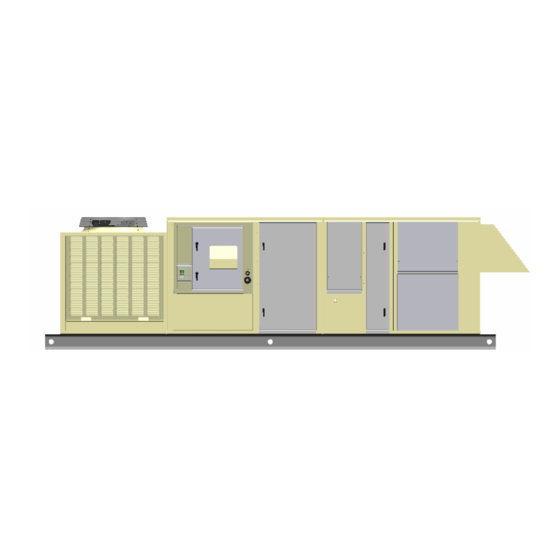Addison DC Series Руководство по установке, эксплуатации и техническому обслуживанию - Страница 7
Просмотреть онлайн или скачать pdf Руководство по установке, эксплуатации и техническому обслуживанию для Кондиционер Addison DC Series. Addison DC Series 19 страниц. High efficiency packaged air conditioning systems

INSTALLATION CONTINUED
Clearances
Adequate clearance around the unit must be kept for
safety, accessibility, service, and maintenance. 48 inches
clearance is required on the rear (furnace and electrical)
end of the unit. This clearance must be maintained for
compressor removal and in the case of a furnace unit, for
removal of the furnace and to insure proper flue gas flow.
Combustion Air Clearances (See Model DF Instruction Manual For Additional Information)
Model
DF
Series
*Provide clearance as shown for safety, for combustion, and for service.
COOLING SYSTEM OPTIONS
Hot Gas Bypass
Hot gas bypass is a means of capacity control during lower
ambient temperature conditions.
The Hot Gas Bypass valve is an adjustable valve and
should be set to open when the refrigerant suction
pressure drops to 110-112 psig. It varies unit capacity by
introducing discharge refrigerant into the evaporator circuit
where it creates a false evaporator load. The hot gas is
cooled prior to its return to the compressor as it passes
through the evaporator.
The Hot Gas Bypass Solenoid Valve is energized through
the thermostat and routes discharge gas to the hot gas
bypass valve. It is de-energized during the pump down
cycle.
Head Pressure Control
Low ambient control. Cycling the condenser fan or fans in
response to compressor discharge pressure will permit
stable operation in ambients down to 32F. The operating
pressure switch is adjustable to match customer needs; it
is factory set to re-energize the fans when discharge
pressure drops to 295 psig and energize them when
pressure increases to 430 psig.
Variable Speed Control
The VARISPEED Fan Control System controls the
compressor discharge pressure. The speed control
module responds to discharge pressure; it speeds the
condenser fan up as pressure rises and slows the fan
down as pressure falls due to load conditions or as
outdoor ambient temperature falls.
6
REQUIRED CLEARANCES
Sides*
Top
Control
Opposite
Width
Of
Furnace
36"
Plus 6"
0"
All combustible materials must be kept out of the area. A
48 inch clearance is also required on the front (outside air)
end of the unit for blower removal and for adequate
outside air accessibility. The clearance of 96 inches on the
filter access side of the unit is required for blower shaft
removal and 36 inches is required on the condenser side
for an adequate supply of condenser air.
Bottom
To
To Non-
Combustibles
Combustibles
24"
Head pressure control is accomplished with one or two
variable speed condenser fan drives, factory set to begin
fan rotation at 380 psig and be at full fan speed at 430
psig.
Dual compressor dual fan units have one variable speed
motor and control on each circuit.
Single compressor four fan units have one variable speed
motor and control and three 3 phase constant speed
motors. Two adjustable pressure controls are used on the
3 fans, the first operating one fan between 440 psig and
355 psig, the second operating two fans between 460 psig
and 375 psig.
CAUTION: Pressure settings on the constant speed fans
must NOT be set so as to permit operation below 355 psig
or the variable speed motor may stall and overheat.
Single compressor, single fan units will have one variable
speed motor and control.
Dual compressor, single fan units will have one variable
speed motor and control with a sensor in each refrigerant
circuit. The control reacts to the higher of the two operating
pressures.
Single compressor dual fan units are equipped with one
variable speed motor and control and one constant speed
three-phase motor.
At low ambient, the variable speed fan operates,
increasing in speed until maximum RPM is achieved at or
around 45°F ambient. An adjustable pressure switch
operates the constant speed three-phase fan set to
energize the motor at 440 psig and de-energize at 355
psig. In the ambient temperature span of approximately
0"
